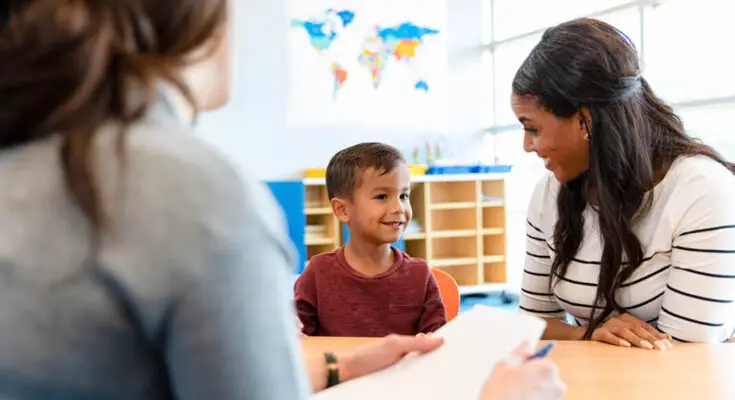Post Preview
Key Takeaways
- Learn how to prepare for a parent-teacher conference effectively.
- Discover key questions to ask during the meeting for insightful feedback.
- Understand the importance of follow-up actions to support your child’s learning.
Table of Contents
- Introduction to Parent-Teacher Conferences
- Preparing for the Meeting
- Questions to Ask Your Child’s Teacher
- Understanding Academic and Social Development
- Exploring the School’s Resources
- Addressing Concerns Constructively
- Follow-Up Actions Post-Conference
- Real-Life Case Studies of Successful Conferences
Parent-teacher conferences are invaluable opportunities to gain insights into a child’s educational experience, offering a platform for parents and teachers to support the student’s development collaboratively. These meetings go beyond discussing test scores and grades; they allow for a holistic understanding of a child’s performance in school. When you thoughtfully ask your child’s teacher about different aspects of their school life, you foster a constructive partnership that can significantly enhance educational outcomes. This comprehensive guide aims to equip parents with strategies to effectively prepare for and engage in these meetings, ensuring their child receives maximum benefit. Whether new to these conferences or a seasoned participant, a thoughtful approach can transform these conversations from routine check-ins to strategic dialogues that shape your child’s learning journey.
Introduction to Parent-Teacher Conferences
Parent-teacher conferences are essential interactions that link the home and school environments, facilitating a deeper understanding of a student’s academic and social experiences. These meetings provide a dedicated time to comprehensively discuss a child’s challenges and achievements. According to educational research, students whose parents are involved in their education tend to perform better academically, showing improved grades, attendance, behavior, and self-esteem. The effectiveness of these conferences lies in their role as a forum for sharing information and aligning on educational goals, making them an integral part of a well-rounded educational strategy.
Preparing for the Meeting
The key to a successful parent-teacher conference lies in thorough preparation. Start by reviewing all relevant details about your child’s academic status, such as recent report cards, homework evaluations, and previous teacher communications. These elements provide context and evidence of your child’s continuous journey through the curriculum. Craft a list covering all your talking points, focusing on areas where you seek clarity or solutions. It can include academic performance, social interactions, or specific feedback your child has mentioned. Ensuring your child is part of this preparation process by encouraging them to express their concerns or highlights they want to be addressed prepares you for the conference. It empowers your child, teaching them self-advocacy early in their educational path.
Questions to Ask Your Child’s Teacher
It is crucial to derive meaningful insights from the conference to comprehensively pose questions covering academic and behavioral realms. Inquiry into academic performance should delve into particular subjects or skills, scrutinizing your child’s performance, areas needing reinforcement, and potential opportunities for enrichment. For example, you might ask your child’s teacher closely how your child is performing regarding comprehension, participation, and consistency across different subjects. To optimize these discussions, familiarize yourself with various educational communication strategies by referring to resources, which can enhance your dialogue and foster a collaborative atmosphere.
Understanding Academic and Social Development
Addressing your child’s academic needs is critical, but understanding their social development is essential for a well-rounded educational experience. Please inquire about your child’s behavior in collaborative settings, peer interactions, and social adaptability within the classroom. Effective communication with teachers can provide insights into your child’s social strengths and areas needing support. This understanding allows parents to address emotional intelligence, fostering skills such as empathy, resilience, and cooperation, which are essential for academically and socially thriving.
Exploring the School’s Resources
Schools often offer many resources to bolster student learning and engagement beyond the classroom. Discuss these resources with the teacher during the conference, including any workshops, clubs, or special programs that align with your child’s interests or academic needs. These extracurricular opportunities provide additional avenues for growth and motivation. Understanding and using these resources can significantly enhance your child’s school experience; for further details, explore various school resources for children available in many educational institutions.
Addressing Concerns Constructively
Conversations about concerns should be approached with a solution-oriented mindset. When discussing challenges, emphasize a collaborative approach to problem-solving, focusing on specific, constructive feedback rather than criticisms. Be receptive to the teacher’s insights and suggestions, as they offer professional observations that might not be apparent from a parental perspective. Such collaboration can often uncover underlying issues that require attention, paving the way for a tailored strategy that addresses your child’s particular needs and strengthens their educational experience.
Follow-Up Actions Post-Conference
The success of a parent-teacher conference does not end at the meeting room door—it extends into the actionable steps taken afterward. Following the conference, consistently implement agreed-upon strategies, supporting your child as needed and tracking their progress against defined goals. Maintaining open lines of communication with the teacher is essential, enabling you to adjust approaches as your child’s needs evolve. This continual exchange fosters a proactive environment where parents and educators remain united to cultivate a supportive and adaptive learning ecosystem for the student’s enduring benefit.
Real-Life Case Studies of Successful Conferences
Learning from real-life success stories can be highly motivational and instructive. Such case studies often showcase how effective communication and strategic collaboration between parents and teachers lead to desirable educational outcomes. They illustrate practical applications of the principles discussed, offering inspiration and replicable strategies for enhancing the parent-teacher conference experience. By reviewing these examples, parents can glean insights into best practices, adapt these methods to fit their unique circumstances, and see first-hand how an engaged parental approach can transform their child’s educational trajectory.
Investing time and effort into preparing for and engaging in parent-teacher conferences will unlock the potential to influence your child’s education positively. When effectively leveraged, these meetings become a cornerstone of an academic strategy that sets a strong foundation for your child’s success throughout their learning journey.



